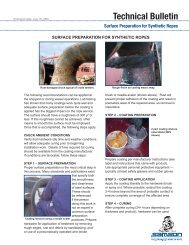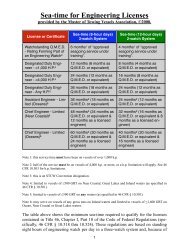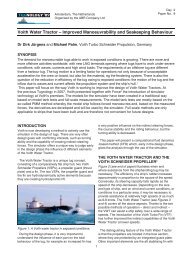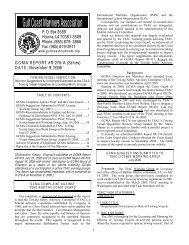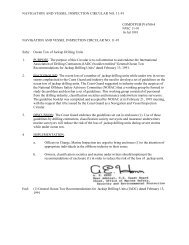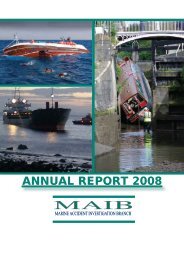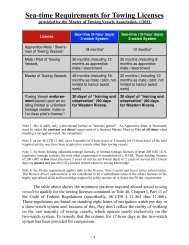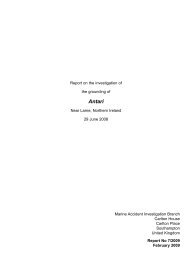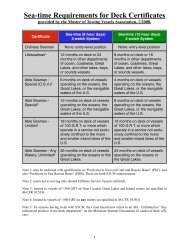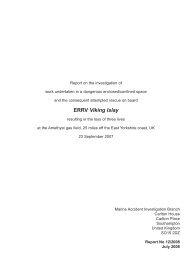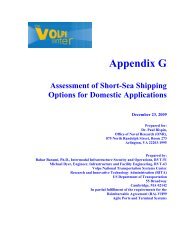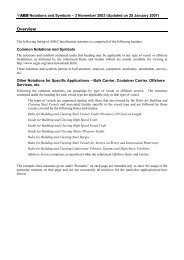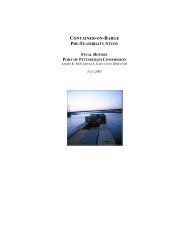R-429-G, Rev. 2 - Towmasters: the Master of Towing Vessels Assoc ...
R-429-G, Rev. 2 - Towmasters: the Master of Towing Vessels Assoc ...
R-429-G, Rev. 2 - Towmasters: the Master of Towing Vessels Assoc ...
Create successful ePaper yourself
Turn your PDF publications into a flip-book with our unique Google optimized e-Paper software.
company administrators, port captains, and o<strong>the</strong>r supervisorsashore to licensed <strong>of</strong>ficers afloat.]— Document # 1 : Declaration <strong>of</strong> Security.— *Document #2: Ballast Water Reporting Form. (This isa running log and daily reporting requirement.)— Document #3: Voyage Plan. (Required before eachsailing.)— Document #4: Report due before each crew change. Iconsider this to be a shift in responsibility. (SOR)— Document #5: Request for money for food rations beforeeach crew change. (SOR)**— Document #6: Monthly tow wire report. (SOR)**— Document #7: Daily billing log. (Not an RCP item).— Document #8: Company accident report. (Completed asneeded. Not an RCP item.)— Document #9: Line inventory. (Due before each crewchange. Not an RCP item).— Document #10: Release and indemnity agreement.Completed for each visitor,— *Document #11: Radio Log. A running log record.— Document #12 - New crewmember orientation checklist.— Document #13: Post orientation performance evaluation.(This report caused many problems.)— Document #14: New crewmember drug and alcoholpolicy.— Document #15: Repair request report. (SOR)**.— Document #16: <strong>Towing</strong> Investigation Report. Eachincident.— Document #17: Reporting & Chemical TestingRequirement (Procedures).— Document # 18: Parts Requisition. Weekly.— Document #19: Supply List Inventory & Requisition.Monthly (SOR)**— Document #20: Overall Checklist for an Uninspected<strong>Towing</strong> Vessel. Due at Crew change. 88 items. (SOR)**— Document #21: Ice Report (Winter season only.)— Document #22: Safety Meeting Report.Weekly.(SOR).**— Document #23: Fire & Boat Drill and Safety Meeting23. Weekly. (SOR)**— *Document #24-: A running trash log record book.— Document #25: Local Notice to Mariners. This requires<strong>the</strong> time to down load <strong>the</strong> document. It takes additionaltime to correct and update <strong>the</strong> charts.— *Document #26: U.S. Army Corps <strong>of</strong> Engineers. VesselOperations Report is a running log and reportingrequirement.Also include time I spend for:— Daily Navigation Equipment & Communications Check.— Weekly test <strong>of</strong> <strong>the</strong> general alarm system.— Time to prepare minutes for weekly safety meeting andfire drill and <strong>the</strong>n execute my plans.— Weekly abandon ship drill.— Weekly steering failure or loss-<strong>of</strong>-power drill.— Bi-weekly man-overboard drill.— Weekly test <strong>of</strong> emergency lighting and power.THE LOGBOOK ISSUE HAS ITS DAY IN COURT[Note: This letter contains several minor editorial changes.]February 16, 2007ATTN; Judge Parlen McKennaU.S. Coast Guard Administrative Law JudgeCoast Guard Island Building 54CAlameda, CA 94501-5100Subject: Amicus Curiae SubmissionFile #GCM-59; Correspondence. #ocma0214.2AYour Honor:I was in attendance in <strong>the</strong> courtroom at MSU MorganCity, LA, during <strong>the</strong> hearing U.S. Coast Guard v. Captain(Name Redacted) that you presided over on February 14,2007. I was very favorably impressed by your persistence inascertaining <strong>the</strong> truth in all matters brought before <strong>the</strong> court.I am Secretary <strong>of</strong> <strong>the</strong> Gulf Coast Mariners <strong>Assoc</strong>iation. Our<strong>Assoc</strong>iation speaks for <strong>the</strong> interests <strong>of</strong> credentialed lowerlevelmariners serving on vessels <strong>of</strong> less than 1,600 GRT.At <strong>the</strong> end <strong>of</strong> <strong>the</strong> hearing, you characterized <strong>the</strong> issues asVery serious Goes to <strong>the</strong> structure <strong>of</strong> <strong>the</strong> Coast Guardsregulatory program. I agree.Since much <strong>of</strong> <strong>the</strong> case revolved around Logbooks Iwould like to address this subject from several viewpoints. Iwill draw no conclusions that reference this particular casebut directly but request that you consider this letter and itsEnclosures. I expect no reply to this letter.I believe that in order to adequately supervise <strong>the</strong>performance <strong>of</strong> <strong>the</strong> duties <strong>of</strong> certificated mariners at seaCongress mandated in 46 U.S. Code §11130(b) that The<strong>Master</strong> <strong>of</strong> <strong>the</strong> vessel shall make or have made in <strong>the</strong> <strong>of</strong>ficiallogbook certain entries. The words have made appear toindicate that <strong>the</strong> actual entries may be made by a persono<strong>the</strong>r than <strong>the</strong> <strong>Master</strong> <strong>of</strong> <strong>the</strong> vessel.The same statute enumerates twelve entries. 46 U.S.Code §11302 describes <strong>the</strong> manner <strong>of</strong> making entries. Ibelieve this law is reasonable and its twelve enumeratedarticle are reasonable requirements for most applicablevessels. I encouraged and applauded <strong>the</strong> work <strong>of</strong> CaptainRichard Stewart, a distinguished faculty member and formerDepartment Head at <strong>the</strong> U.S. Merchant Marine Academyand Chairman <strong>of</strong> <strong>the</strong> Merchant Marine Personnel AdvisoryCommittee (MERPAC), who last revised and validated <strong>the</strong>Coast Guards Official Logbook in 2003.Unfortunately, Congress in <strong>the</strong> same law, limited <strong>the</strong>application <strong>of</strong> <strong>the</strong>se requirements to vessels on international andintercoastal voyages and to vessels <strong>of</strong> over 100 tons. Our<strong>Assoc</strong>iation is actively trying to convince both <strong>the</strong> Coast Guardand Congress to set standards for maintaining logbooks on allcommercial vessels and not just vessels over 100 GRT. Ourefforts began in 2000 and are reflected in GCMA Report #R-291, <strong>Rev</strong>ision 1 (1) In <strong>the</strong> case before <strong>the</strong> court, since <strong>the</strong> vesselwas less than 100 GRT and was not on an international orintercoastal voyage, it did not require an Official Logbook.[ (1) i.e., an earlier edition <strong>of</strong> this report.]The American Waterways Operators, a trade associationrepresenting only one segment <strong>of</strong> <strong>the</strong> marine industry, doeshave logbook requirements listed (above). Our <strong>Assoc</strong>iationagrees with and fully supports <strong>the</strong>se standards.Unfortunately, <strong>the</strong>se standards apply only to AWO membercompanies and are not enforceable unless <strong>the</strong>y are part <strong>of</strong>9 February 2007



